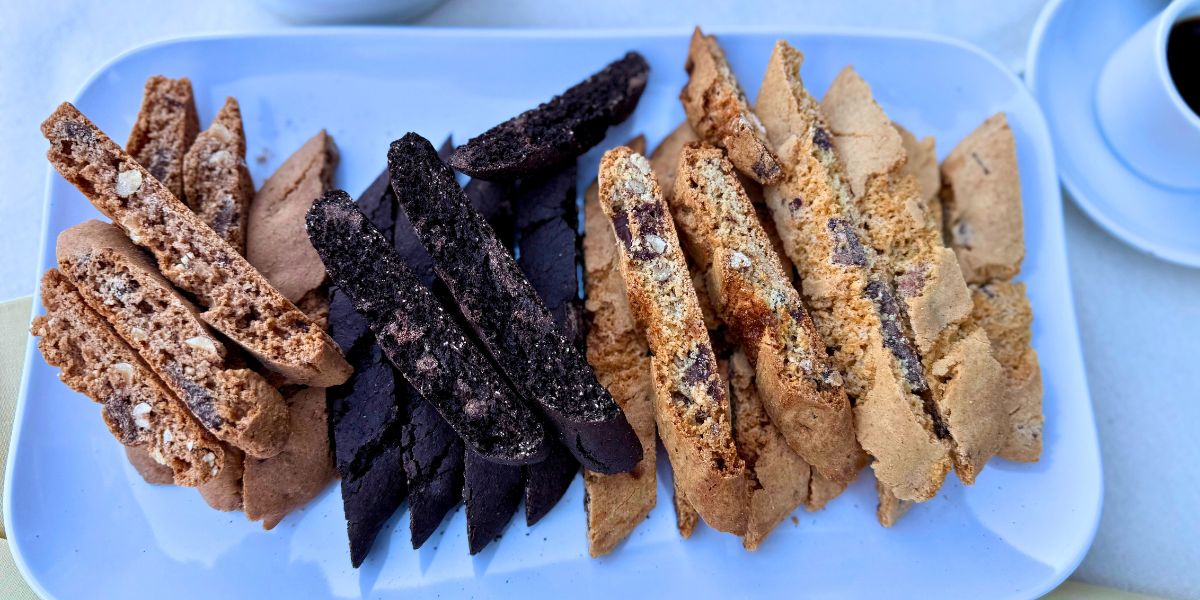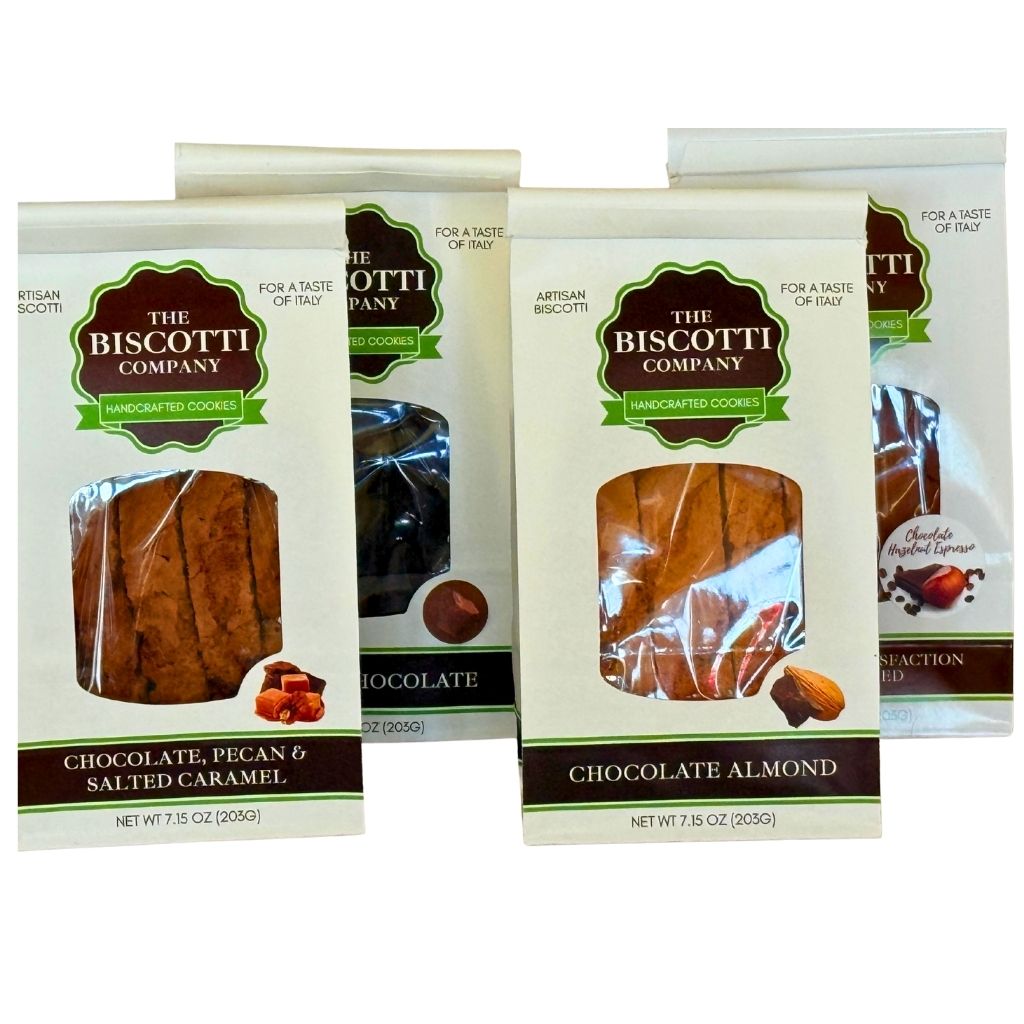Blog
Coffee and Biscotti Pairing Cheat Sheet | Pick Your Perfect Match
Coffee and Biscotti: The Pairing Cheat Sheet
Pick the right biscotti for your coffee in seconds. Quick answers, a pairing chart, and a simple dunking method that works.
Coffee and biscotti is the classic combo because biscotti was made for dunking. If you searched for biscotti with coffee, biscotti for coffee, or a biscotti coffee pairing, this cheat sheet gives you the answer fast and puts the pairing chart front and center.
If you want more flavor notes and extra pairings, read The Perfect Coffee and Biscotti Pairings for 2026. If you are new to biscotti, start with The Biscotti Guide.
Helpful basics: What is biscotti and Biscotti nutrition facts.
The Chocolate Lovers Four-Pack
One click gets you four chocolate flavors customers reach for with coffee. If you want bold and easy, this is the move.

The first sounds I hear in the morning are roosters. A few neighbors have them, and I love it. I let the dogs out, take in the quiet, then come back inside to the smell of coffee brewing.
My parents always started their weekends with espresso and almond biscotti. It’s the ritual I grew up with, and it still shapes how I bake and how I drink coffee today.
Sunday morning on Long Island hits different when you know you don’t have to go anywhere. I brew a fresh pot of black coffee and open a bag of Almond Biscotti. I grab two, then I grab a third because I’m me.
I bring it all to bed and park myself by the sliding glass door like it’s my front-row seat to the world. Today the backyard is covered in fresh snow, quiet and white like someone hit mute.
And when I dunk that almond biscotti, the edges go soft, the center keeps its clean snap, and that warm, nutty bite with the dark coffee makes the whole morning feel complete.

A quiet winter morning on Long Island. Coffee, biscotti, and nowhere to rush.
Best biscotti with coffee: Almond
Best biscotti for espresso: Almond or Double Chocolate
Best biscotti for drip coffee: Anise or Almond
Best biscotti for latte: Chocolate Almond
Best biscotti for cold brew: Double Chocolate
Do you dip biscotti in coffee? Yes. Quick dunk only. Soft edge, crunchy center.

Pick your coffee, pick your biscotti
Go Almond for classic or Double Chocolate for bold.
Pick Chocolate Almond for flavor that still shows up through milk.
Choose big flavor: Double Chocolate or Cranberry Pistachio.
Pair the same flavor with the same coffee for one week. You will notice the little details fast. Then switch one thing. Different roast. Different biscotti. Keep it simple and you’ll find your “perfect match” in a few days.
Why coffee and biscotti work so well
Biscotti is twice baked, which gives it that crisp snap and the strength to handle a dunk. Coffee brings warmth, aroma, and a little bitterness. Together, you get balance.
The coffee softens the edges while the center stays crunchy. That contrast is the whole point.
Strong coffee loves bold biscotti. Light coffee loves brighter, lighter flavors.
Espresso hits fast. Lattes are softer. Cold brew is smooth and chilled. Pair accordingly.
The 30-second pairing rule
Match strength, not just flavor
If your coffee is light, go for biscotti that feels light. If your coffee is dark, go for biscotti that can stand up to it. You want both parts to be heard.
Match texture to the drink
Espresso likes a sturdy dunk. Milk drinks need flavor that still shows up. Cold drinks love flavors that pop even when chilled.
For more pairings, read the coffee and biscotti pairing guide.
Coffee and biscotti pairing chart
This chart is the whole point. Save it. Screenshot it. Use it.
| Coffee drink | Best biscotti with coffee | Why it works |
|---|---|---|
| Espresso |
Almond Biscotti, Double Chocolate |
Bold dunk. Clean finish. |
| Americano |
Almond, Cranberry Pistachio |
Simple coffee. Bright crunch. |
| Cappuccino |
Chocolate Almond, Cranberry Pistachio |
Foam plus cocoa notes love chocolate. |
| Latte |
Chocolate Almond, Lemon Biscottini |
Milk softens coffee. Flavor must pop. |
| Drip coffee (medium roast) |
Almond, Anise |
Comfort pairing. Simple and classic. |
| Dark roast | Double Chocolate | Dark roast needs bold and rich. |
| Cold brew / iced coffee |
Double Chocolate, Cranberry Pistachio |
Big flavor even when cold. |
Chocolate Lovers Four-Pack.
Note: The Chocolate Lovers Four-Pack includes four chocolate-forward flavors customers love with coffee.

Best biscotti for coffee by vibe
Espresso or Americano with Almond.
If you want a little sparkle, go Cranberry Pistachio.
Drip coffee or espresso with Anise Biscotti.
Crisp, aromatic, and made for coffee.
Medium roast with Chocolate Almond.
For a bright finish, try Lemon Biscottini.
Dark roast with Double Chocolate.
Rich, bold, and not shy.
How to dunk biscotti in coffee without it falling apart
The goal is not to soak the biscotti. The goal is to soften the edge and keep the crunch. Use the 2-dip method: quick dip, flip, quick dip. Wait about 3 seconds before you bite.
Touch the biscotti to the coffee for about 1 second. That is it.
Flip it and do one more quick dip. This softens both edges evenly.
Give it a quick moment, then bite. Soft edge. Clean snap in the center.
If it breaks, you dipped too long. Next time, keep it quick.
If you searched “Bucks County Biscotti”
If you landed here after searching Bucks County Biscotti, you’re probably just looking for a biscotti that actually pairs well with your coffee. Focus on freshness, thickness, and flavor balance. The right biscotti should dunk clean, not crumble.
If you want the basics, start with The Biscotti Guide.
Keeping biscotti fresh
Biscotti is best enjoyed within about a week of opening. Keep it sealed or in an airtight container. Unopened bags have a six-month shelf life from the production date printed on the bag. Do not freeze.
Frequently Asked Questions
What’s the best biscotti to dunk in coffee?
Almond is the classic for a reason. It holds up well, tastes great with almost any roast, and it’s an easy everyday pairing.
If you want bold, go Double Chocolate.
What biscotti goes best with espresso?
Espresso pairs best with Almond, Double Chocolate, or Anise. Espresso is strong, so it can handle a biscotti that has real flavor.
What’s the best biscotti with a latte or cappuccino?
Lattes and cappuccinos pair well with Chocolate Almond and Cranberry Pistachio. The milk makes the coffee softer, so a biscotti with clear flavor works best.
Can you eat biscotti with iced coffee or cold brew?
Yes. Cold brew is smooth and chilled, so pick flavors that still taste big when cold, like Double Chocolate or Cranberry Pistachio.
What if I’m new to biscotti?
Start here: The Biscotti Guide. It covers what biscotti is, how to enjoy it, and how to pick the right flavor.
How do I keep biscotti fresh after opening?
Biscotti is best within about a week of opening. Reseal the bag tightly or move biscotti into an airtight container. Unopened bags have a six-month shelf life from the production date printed on the bag. Do not freeze.
What’s your shipping and handling time?
We typically process orders within 1 business day. Shipping is $5 nationwide, or free over $50 after coupons. Typical transit is about 3 days East Coast, 5 days Central, and 7 days West Coast.
Where can I learn more about pairing biscotti and coffee?
Read the full guide here:
The Perfect Coffee and Biscotti Pairings for 2026.


This guide makes it so easy to experiment with new coffee and biscotti pairings! I’m excited to try pairing with different coffees based on the vibe – I think I need something lighter for mornings and richer for evenings.